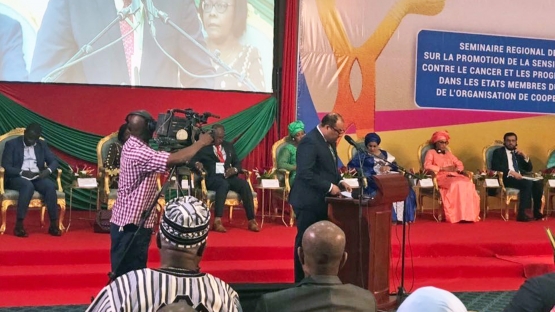First Ladies from sixteen African countries have convened at a high-level regional seminar on cancer awareness and advocacy in Ouagadougou, Burkina Faso, from 1 to 2 August. The two day seminar, organized under the auspices of the Organisation of Islamic Cooperation (OIC), aimed to raise awareness of the importance of cancer prevention, as well as of strengthening diagnostic and treatment capacities in the OIC Member States.
The First Ladies of Burkina Faso, Benin, Cameroon, Cote D’Ivoire, Gabon, Gambia, Guinea, Guinea-Bissau, Mali, Mozambique, Niger, Nigeria, Uganda, Senegal, Sierra Leone and Chad emphasized the urgent need to launch and implement educational and empowerment programmes that would promote a preventative approach in cancer management. Participants shared the experiences of their respective countries, and expressed their commitment to join efforts to raise awareness of the increasing cancer burden in the region, and to improve access to cancer care.
Shaukat Abdulrazak, Director of the Division for Africa, addressed the seminar, underlining the important role that nuclear technologies play in cancer prevention, early detection and treatment. Mr. Abdulrazak outlined the IAEA’s efforts to improve the availability of radiotherapy in Africa, stressing that safety remains the Agency’s key priority. The continued need to train more personnel, including radiation oncologists, medical physicists, radiotherapy technicians and nurses, was also underscored. Mr. Abdulrazak also stressed that to ensure the growing global cancer epidemic is tackled in an effective and holistic manner, all relevant stakeholders, including governments, funding institutions, international organizations and NGOs, should work together and reinforce partnerships.
Upon the conclusion of the event, the First Ladies signed a Declaration that contains recommendations for the OIC Member States. These recommendations focus on early diagnosis and prevention of cancer, and emphasize the need to improve access to appropriate technologies, including nuclear medicine.



